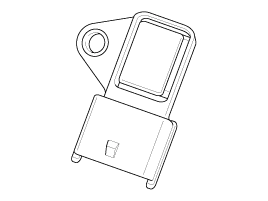Hyundai Genesis (DH): Engine Control System / Intake Air Temperature Sensor (IATS) Description and Operation
Hyundai Genesis (DH) 2013-2016 Service Manual / Engine Control / Fuel System / Engine Control System / Intake Air Temperature Sensor (IATS) Description and Operation
| Description |
Intake Air Temperature Sensor (IATS) is included inside Barometric Pressure Sensor and detects the intake air temperature.
To calculate exact air quantity, correction of the air
temperature is needed because air density varies according to the
temperature. So the ECM uses not only BPS signal but also IATS signal.
This sensor has a Negative Temperature Coefficient (NTC) thermistor and
its resistance changes in reverse proportion to the temperature.

Inspection 1. Connect the GDS on the Data Link Connector (DLC). 2. Measure the output voltage of the BPS at idle and with the ignition ON. Specification: Refer to "Specification" Removal 1.
Specification TemperatureResistance (k?)
Other information:
Hyundai Genesis (DH) 2013-2016 Service Manual: Description and Operation
D
Hyundai Genesis (DH) 2013-2016 Service Manual: Refrigerant Line Repair procedures
Replacement 1. Discharge refrigerant from refrigeration system. 2. Replace any faulty tubes or hoses. Cap the open fittings immediately to keep moisture or dirt out of the system. 3. Tighten the bolt or nut joint to the specified torque.
Categories
- Manuals Home
- Hyundai Genesis Owners Manual
- Hyundai Genesis Service Manual
- Steering System
- 4 Wheel Drive (AWD) System
- Components and Components Location
- New on site
- Most important about car
Copyright В© 2025 www.hgenesisdh.com - 0.024
